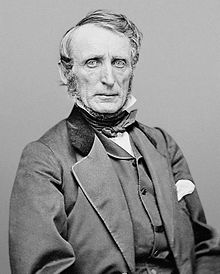John A. Bingham
| John Armor Bingham | |
|---|---|
 |
|
| Member of the U.S. House of Representatives from Ohio's 21st district |
|
|
In office March 4, 1855 – March 3, 1863 |
|
| Preceded by | Andrew Stuart |
| Succeeded by | Martin A. Foran |
| Member of the U.S. House of Representatives from Ohio's 16th district |
|
|
In office March 4, 1865 – March 3, 1873 |
|
| Preceded by | Joseph Worthington White |
| Succeeded by | Lorenzo Danford |
| 7th United States Ambassador to Japan | |
|
In office October 7, 1873 – July 2, 1885 |
|
| President | Ulysses Grant |
| Preceded by | Charles E. DeLong |
| Succeeded by | Richard B. Hubbard |
| Personal details | |
| Born |
January 21, 1815 Mercer, Pennsylvania, U.S. |
| Died | March 19, 1900 (aged 85) Cadiz, Ohio, U.S. |
| Spouse(s) | Amanda Bingham |
| Profession | Politician, lawyer, judge |
John Armor Bingham (January 21, 1815 – March 19, 1900) was an American Republican Representative from Ohio, an assistant to Judge Advocate General in the trial of the Abraham Lincoln assassination, and a prosecutor in the impeachment trials of Andrew Johnson. He is also the principal framer of the Fourteenth Amendment to the United States Constitution.
Born in Mercer County, Pennsylvania, where his carpenter and bricklayer father, Hugh, had moved after service in the War of 1812, Bingham attended local public schools. After his mother's death in 1827, his father remarried. John moved west to Ohio to live with his merchant uncle, Thomas, after clashing with his new stepmother. The teenager apprenticed as a printer for two years, helping to publish the Luminary, an anti-Masonic newspaper. He then returned to Pennsylvania to study at Mercer College, after which Bingham studied law at Franklin College in New Athens, Harrison County, Ohio. There, Bingham befriended former slave Titus Basfield, who became the first African American to graduate college in Ohio. They continued to correspond for many years.
Both Hugh and Thomas Bingham were long time abolitionists as well as active in local politics. They initially allied with the Anti-Masonic Party, led by Pennsylvania Governor Joseph Ritner and Speaker of the Pennsylvania Assembly Thaddeus Stevens. Hugh became clerk of the Mercer County court and later a perennial Whig candidate in the county, known for opposing war with Mexico. Rev. John Walker, of the Associated Reform Congregational Church, ran Franklin College and was a prominent abolitionist in Ohio as well as mentor to Titus Basfield, who, after further studies, became a Presbyterian minister. Another of Bingham's longtime and childhood friends was Matthew Simpson, who later became a bishop in the Methodist Episcopal Church, urged President Lincoln to issue the Emancipation Proclamation, and ultimately delivered funeral orations for the assassinated President at the White House and his interment at Springfield, Illinois.
...
Wikipedia
